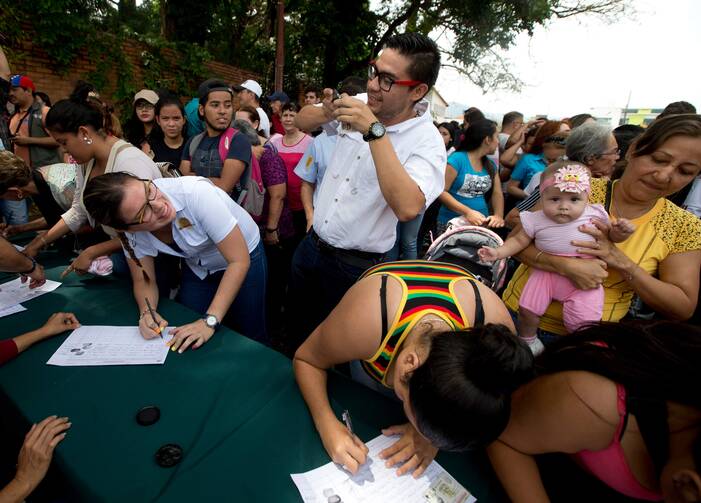Venezuelan cities cleaned up from a night of looting and fiery protests Wednesday as government offices closed their doors for the rest of the week in the face of a worsening energy crisis that is causing daily blackouts.
Amid complaints about the electricity crisis, opposition members began a previously planned signature gathering campaign aimed at recalling President Nicolas Maduro.
The socialist administration began imposing a four-hour daily blackout around the country this week to save power. Then on Tuesday, Maduro announced that millions of officials will now work only Mondays and Tuesdays, taking the rest of the week off to use less electricity.
Angry residents in darkened towns around the country took to the streets Tuesday night, setting up flaming barricades and raiding shops for bread and other scarce food.
On Wednesday, hundreds of police fanned out around the western city of Maracaibo after a night of looting on darkened streets. Venezuela is among the world's most violent countries, and crime generally spikes here when the lights go out.
The administration says the water level behind the nation's largest dam has fallen to near its minimum operating level because of a severe drought. Experts say lack of planning and maintenance is also to blame.
Caracas is being spared from the rolling blackouts, and has not seen violent protests. Some here complain that the country is starting to resemble the dystopian series "The Hunger Games," in which districts suffer for the benefit of the heartless capital city.
As people become more desperate in outlying states, politicians in Caracas are appealing for calm after scoring a small victory that will allow them to begin the effort to recall Maduro.
Venezuela's electoral authority on Tuesday delivered the petition sheets the opposition needs to collect signatures for a formal petition drive. Some in the opposition had believed that the government would never hand those sheets over.
Opposition leaders held a rally to launch the start of the recall drive Wednesday as many institutional buildings downtown remained closed.
Retired Environmental Ministry worker Edgar Diera sat on the steps of the Justice Ministry, making doomsday predictions to people who showed up only to find the doors locked.
"A country needs its workers to show up," he said, shaking a newspaper at a snarl of cars in front of a broken traffic light. "This place is in ruins."
People working for the state, the country's largest employer, will be paid for the days they're sent home. Some have been using their Fridays off to wait in lines to buy groceries and other goods. Others have been going home to watch TV and run the air conditioning, leading critics to say the furlough is not an effective energy-saving measure.
There's also the question of the jobs they will be leaving undone.
"The measure will paralyze Venezuela's public administration, further hampering the state's ability to function," said Diego Moya-Ocampos, an analyst with the London-based consulting firm IHS Global Insight.
___
Copyright 2016 The Associated Press. All rights reserved. This material may not be published, broadcast, rewritten or redistributed.








